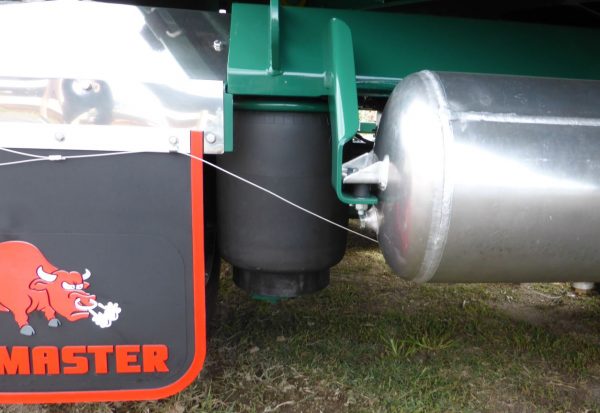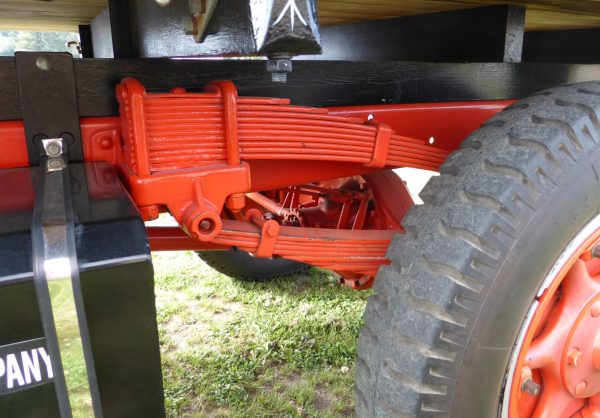Many new lorries and trailers come fitted with air suspension, or at least have an option to have it fitted at extra cost. Older lorries and trailers can sometimes be retrofitted, too. Air suspension has many advantages but a few disadvantages, too.

The black suspension air bag can be seen next to the mud guard in the middle of this photo
Improved fuel economy
The higher your suspension is, the more the wind resistance of the lorry and trailer. Advanced air suspension systems can adjust the ride height based on the load’s weight and the journey type. For long, smooth motorway journeys with light loads that don’t compress the suspension as much as heavy loads, the suspension can be adjusted lower to take advantage of the reduced profile. For heavy loads, the suspension can be made as firm as required.
Reduced vibration
Reduced vibration is better for the driver and for the cargo. Long haul drivers can experience back pain due to sitting for extended periods in a vibrating truck cab. Vibration causes fatigue and discomfort, too; a smoother ride is nicer for a driver.
A smoother ride is also easier on the lorry and the trailer as it’s not shaken to bits over time. Cargo carried by the lorry is less likely to be damaged (although, packaging and load restraint methods these days are very good anyway). Cargo is less likely to shift, too.
Less damage to the road
A smoother ride means less damage to the road surface, and much less vibration transmitted into roadside structures such as bridge parapets and buildings.
Improved tyre wear and handling
Less vibration and a better spread of the load through levelling results in improved tyre wear. Some air suspension can lift unused axles, extending the life of those tyres.
Suspension is a big factor in how a vehicle handles, too. Better suspension could mean less likelihood of a rollover event.
Better resale values on lorries and trailers
You’re more likely to sell your lorry or trailer for a higher price with air suspension.
More versatile
A trailer can be used for more types of loads when the suspension setup is flexible. Fragile loads such as glass are less likely to be damaged. Loads with difficult weight distribution can be levelled.
Disadvantages of air suspension
Some operators report tests that are inconclusive saying that in an articulated lorry, the ride in the front of the trailer is totally dependent on the suspension of the tractor unit, but at the back of the trailer leaf springs can often give a better ride, depending on the load.
Air suspension can be around 50kg heavier than leaf spring suspension which means that you could, instead, install other aerodynamic devices such as trailer skirts and cab side vanes to get fuel economy gains instead.
Leaf spring suspension is much more durable and usually doesn’t need much maintenance for the first 5-7 years, after which it will need to be retorqued. Air suspension, on the other hand, can require more maintenance – up to 3 times the cost in the first ten years. Air suspension can leak and you’ll need to keep a spare air line and other parts. Air suspension also needs to be tested more frequently, which takes time.

Leaf springs on a historic lorry
Drivers need to know how the air suspension works and how to troubleshoot it if something goes wrong.
